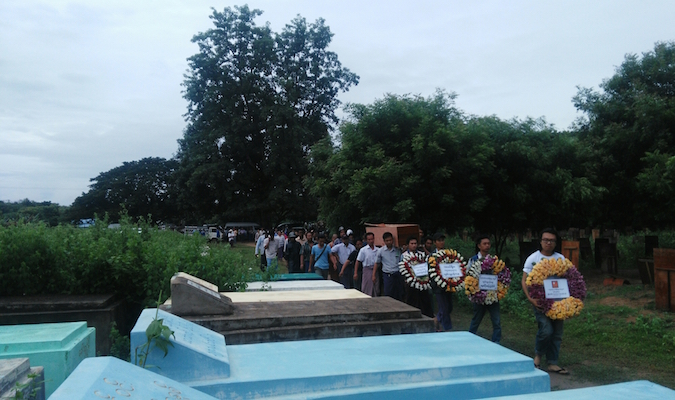“Until the end of the wake” by Lynn Moe Swe (1976-2017):
The funeral I wrote down happens today.
Or, does it?
The opening lines of “Until the end of the wake” by Lynn Moe Swe anticipate afterlife. Lynn Moe Swe, who died of Dylan-Thomas Syndrome aka alcohol poisoning in the wee hours of Monday, September 18, in his hometown Monywa, was one of Myanmar’s most outstanding poets of his generation. He was 41.
The hard-to-attain human life is
as fragile as an earthen pot. They’re about to smash
that same old Buddhist cliché all over again.
How long does it take to booze oneself to death in contemporary Myanmar? The answer is five months, according to Lynn. Since April, Lynn had been drinking a type of moonshine widely known as BE, which has seedy origins in the socialist-era Burma Economic Development Corporation (BEDC). Monywa poets are known for both Thomasesque boozing and rowdy language. Lynn, however, was extremely introverted and introspective, very much like his finely crafted poems.
Lynn was a high school teacher when he wasn’t writing poems. The pattern of his drinking showed that he would drink excessively for two to three months, usually during the school holidays from around February to April. He would hardly write poems during the boozy season. In recent months though, he started drinking in April and the brake on alcoholism had failed to the extent that he was often seen drinking at his favourite BE shop during school hours.
Poet Tun Ko, his pal, said that Lynn had four girlfriends or so — one of whom, an engineer from Dubai, happened to be in Myanmar and attended his funeral — a neat smart phone for social media, a fine scooter for his commutes, and had no obvious reason for self-destruction. Above all else, Lynn was obviously in love with the inferior BE and would wash his face in it first thing in the morning. Each time after he collected his high school teacher salary, he would pay a month advance to the BE shop so he could patronize it without money worry until his next salary.
His mother told me that he would usually listen if she told him to quit, but he would walk out on her in his final weeks. In a desperate attempt to discipline Lynn, the mother even considered asking Lynn’s boss, the headmistress of his school, to lay him off. Lynn was very fond of baseball caps. He was always seen wearing a cap, and had a collection of about 15 caps. He lost all of them — one at a time, during his intoxicated sprees, added his father. A day before, a private hospital in Monywa had declared Lynn, who had been in coma for five days, brain-dead. When he was carried home by his parents and poet friends, his heart was still pounding.
They linger over the goner.
They eulogize him as if he were a twitching leaf floating in the wind.
“Is he really dead? He looks as if he were asleep?”
The fact that the poet’s heart outlived his brain for a few hours gave family and friends a shimmer of hope that he might wake up again.
Their wails fester.
What if he could hear “Well done, well done, well done!”
at the end of the sermon?
What if he wakes up and walks again?
What if he wakes up and quips,
“Didn’t I look dead when I was asleep?”
While Lynn’s body lied in wake at his home for around 12 hours, a typical Burmese concrete tomb was hastily built for him at a cemetery nearby. By 5 p.m. on the same day of his death, the funeral procession, a few cars and dozens of scooters, three wreaths from three different Myanmar poets organizations and one from a Monywa library where he was a volunteer, headed for the cemetery. Upon arrival at the cemetery, each member of the funeral procession received a small plastic bag containing a drinking water bottle, and packets of washing detergent and shampoo from Lynn’s family members and friends. Lest one should be soiled with death, it is customary to wash oneself after a burial service in Myanmar. In the cemetery pavilion, a team of monks gave a send-off sermon to Lynn and the survived. After the sermon, the monks left and Lynn was carried off towards his freshly-built tomb.
In the entombment, the coffin, carried by a number of his friends and relatives, was simply placed in the huge tomb, much like a matchstick drawer pushed into a matchbox, and sealed off with brick and mortar. At his funeral no earthen pot was smashed. One of his colleagues from his school read out an order terminating him from his duties. Another from a public library where he was a volunteer relieved him of his responsibilities.
The last time I heard from Lynn Moe Swe was on April 14th when he emailed me the manuscript of his new collection of 50 poems. Perhaps he wanted me to translate the poems, but was too shy to ask? The brief entombment concluded when a friend of Lynn took a twig, and announced that his soul would be welcome back to the family home for a stay before it decided to wander off again as exactly Lynn Moe Swe has written down:
Once a burial is done,
no one turns back at the graveyard.
Both the living and the dead must
hurry home.
How come the black hounds don’t howl today?
A tiny twig has just replaced a man.


